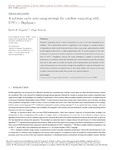Mostrar o rexistro simple do ítem
A Software Cache Autotuning Strategy for Dataflow Computing with UPC++ DepSpawn
| dc.contributor.author | Fraguela, Basilio B. | |
| dc.contributor.author | Andrade, Diego | |
| dc.date.accessioned | 2022-01-31T17:46:37Z | |
| dc.date.available | 2022-01-31T17:46:37Z | |
| dc.date.issued | 2021 | |
| dc.identifier.citation | Fraguela, BB, Andrade, D. A software cache autotuning strategy for dataflow computing with UPC++ DepSpawn. Comp and Math Methods. 2021; 3:e1148. https://doi.org/10.1002/cmm4.1148 | es_ES |
| dc.identifier.uri | http://hdl.handle.net/2183/29512 | |
| dc.description | This is the accepted version of the following article: B. B. Fraguela, D. Andrade. A software cache autotuning strategy for dataflow computing with UPC++ DepSpawn. Computational and Mathematical Methods, 3(6), e1148. November 2021, which has been published in final form at http://dx.doi.org/10.1002/cmm4.1148. This article may be used for noncommercial purposes in accordance with the Wiley Self-Archiving Policy [http://www.wileyauthors.com/self-archiving]. | es_ES |
| dc.description.abstract | [Abstract] Dataflow computing allows to start computations as soon as all their dependencies are satisfied. This is particularly useful in applications with irregular or complex patterns of dependencies which would otherwise involve either coarse grain synchronizations which would degrade performance, or high programming costs. A recent proposal for the easy development of performant dataflow algorithms in hybrid shared/distributed memory systems is UPC++ DepSpawn. Among the many techniques it applies to provide good performance is a software cache that minimizes the communications among the processes involved. In this article we provide the details of the implementation and operation of this cache and we present an autotuning strategy that simplifies its usage by freeing the user from having to estimate an adequate size for this cache. Rather, the runtime is now able to define reasonably sized caches that provide near optimal behavior. | es_ES |
| dc.description.sponsorship | This research was funded by the Ministry of Science and Innovation of Spain (TIN2016-75845-P and PID2019-104184RB-I00, AEI/FEDER/EU, 10.13039/501100011033), and by the Xunta de Galicia co-funded by the European Regional Development Fund (ERDF) under the Consolidation Programme of Competitive Reference Groups (ED431C 2017/04). The authors acknowledge also the support from the Centro Singular de Investigación de Galicia “CITIC,” funded by Xunta de Galicia and the European Union (European Regional Development Fund- Galicia 2014-2020 Program), by grant ED431G 2019/01. They also acknowledge the Centro de Supercomputación de Galicia (CESGA) for the use of its computers | es_ES |
| dc.description.sponsorship | Xunta de Galicia; ED431C 2017/04 | es_ES |
| dc.description.sponsorship | Xunta de Galicia; ED431G/01 | es_ES |
| dc.language.iso | eng | es_ES |
| dc.publisher | Wiley | es_ES |
| dc.relation | info:eu-repo/grantAgreement/MINECO/Plan Estatal de Investigación Científica y Técnica y de Innovación 2013-2016/TIN2016-75845-P/ES/NUEVOS DESAFIOS EN COMPUTACION DE ALTAS PRESTACIONES: DESDE ARQUITECTURAS HASTA APLICACIONES (II)/ | |
| dc.relation | info:eu-repo/grantAgreement/AEI/Plan Estatal de Investigación Científica y Técnica y de Innovación 2017-2020/PID2019-104184RB-I00/ES/DESAFIOS ACTUALES EN HPC: ARQUITECTURAS, SOFTWARE Y APLICACIONES/ | |
| dc.relation.uri | https://doi.org/10.1002/cmm4.1148 | es_ES |
| dc.subject | Autotuning | es_ES |
| dc.subject | Dataflow computing | es_ES |
| dc.subject | Distributed memory | es_ES |
| dc.subject | Locality | es_ES |
| dc.subject | PGAS | es_ES |
| dc.subject | Runtimes | es_ES |
| dc.title | A Software Cache Autotuning Strategy for Dataflow Computing with UPC++ DepSpawn | es_ES |
| dc.type | info:eu-repo/semantics/article | es_ES |
| dc.rights.access | info:eu-repo/semantics/openAccess | es_ES |
| UDC.journalTitle | Computational and Mathematical Methods | es_ES |
| UDC.volume | 3 | es_ES |
| UDC.issue | 6 | es_ES |
| UDC.startPage | e1148 | es_ES |
| dc.identifier.doi | 10.1002/cmm4.1148 |
Ficheiros no ítem
Este ítem aparece na(s) seguinte(s) colección(s)
-
GI-GAC - Artigos [182]






